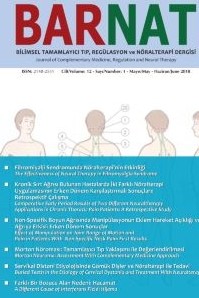KONYA YÖRESİNDE YETİŞTİRİLEN CİVAN PERÇEMİ (MİLLEİFOLİİ HERBA) BİTKİSİNİN FİTOKİMYASAL ANALİZ SONUÇLARI
Giriş: Civan perçemi (Milleifolii herba), Papatyagiller familyasının üyesi olan çiçekli bir bitkidir. Asya, Avrupa ve Kuzey Amerika gibi kuzey
yarımkürenin ılıman bölgelerine özgüdür. Civan perçemi (Milleifolii herba) uçucu yağlarının %80'inin monoterpen olması gerektiği
bildirilmektedir. Civan perçemi ana bileşenleri arasında 6 farklı kemotip bulunmaktadır. Seskiterpen grubu guaianolit, germakranolit,
ödesmanolit olup anti-inflamatuar, antiödematöz, antimikrobiyal etki gösterirler. Flavonoid olarak rutin, apigenin içerir. Kinin nedeniyle
sekresyon ve iştah artırıcı etkileri bulunmaktadır. Azulen ve ve flavonoidler nedeniyle spazmolitik etkilidir. Mide mukozası irritasyonlarında
kullanılır. Gastroprotektif bir drog olarak tanımlanmaktadır. Azulen ve kamazulen uçucu yağa yara iyileştirici özellik vermektedir.
Enflamasyonun belirtileri giderici özelliği bulunmaktadır. Bu çalışma ile Konya bölgesinde yetiştirilen civan perçemi (Millefolii herba)
bitkisinin fitokimyasal analizini sunmayı amaçladık.
Metod: Numune olarak Konya yöresinde Temmuz Organik Çiftliğinde yetiştirilen bitki kullanılmıştır. Batı Akdeniz Antalya Tarım Orman
Bölge Müdürlüğü laboratuvarında analizler yapılmıştır. Analizde total uçucu yağ miktarı flavonoid miktarı tespit edildi. Civanperçemi
çiçeği ucucu yağ miktarı hidrodistilasyon yöntemiyle, Uçucu yağ bileşimi ise C-MS/FID yöntemiyle tespit edildi.
Sonuç: Bu çalışma ile Konya bölgesinde yetiştirilen civan perçemi (Millefolii herba) bitkisinin fitokimyasal analizini sunmayı amaçladık.
Civan perçeminin toplam uçucu yağ miktarı % 0,62 bulundu. Civan perçemi tıbbi bitkisinin uçucu yağ oranının Avrupa Farmakope
standartlarında olduğu tespit edildi. Sırasıyla % 31,25 ile piperitone ilk sırayı almakta %14,49 ile p-mentha -1,5-dien-8-ol, % 10,61 ile
α-pinene oluşturmaktadır. Literatür çalışmalarında Avrupa ülkelerinin içerik analizlerine bakıldığında Estonya bölgesinde yetiştirilen bitkilerde
Kamuzulen ve monoterpen miktarının diğer Avrupa ülkelerinden (Macaristan, Yunanistan, Moldovya, Litvanya, Almanya) daha
yüksek olduğunu göstermektedir. Civanperçemi gastroprotektif drog olarak önerilmektedir. Ayrıca antiinflamatuar özelliği nedeniyle
prostat adenektomi sonrası kullanımı da mevcuttur.
Anahtar Kelimeler:
Civanperçemi, Konya bölgesi, uçucu bileşen.
PHYTOCHEMICAL ANALYSIS RESULTS OF MILLEIFOLII HERBA PLANT GROWN IN KONYA REGION
Introduction: Achillea millefolium, commonly known as yarrow or common yarrow, is a flowering plant in the family Asteraceae. It
is native to temperate regions of the Northern Hemisphere in Asia and Europe and North America. Achillea millefolium (Asteraceae,
yarrow) has been used in folk medicine against several disturbances including skin inflammations, spasmodic and gastrointestinal
disorders. In this study, we aimed to present phytochemical analysis of mercury (Millefolii herba) plant grown in Konya region.
It is reported that 80% of the essential oils of mercury (Milleifolii herba) must be monoterpene. Sesquiterpene group is guaianolite,
germacranolite, edesmanolite and has anti-inflammatory, anti-edematous, antimicrobial effect. As flavonoid routine, it contains apigenin.
Quinine has effects that increase secretion and appetite. It is spasmolytic due to azulene and flavonoids. It is used in gastric
mucosa irritations. It is defined as a gastroprotective drug. Azulene and camazulene give wound healing properties to essential oil.
The symptoms of inflammation are relieving.
Method: Plants grown in July Organic Farm in Konya region were used. Analyzes were conducted in the laboratory of the Western
Mediterranean Antalya Regional Directorate of Agriculture and Forestry. Total volatile oil content flavonoid amount was determined nedeniyin
the analysis. The amount of essential oil of lavender plant grown in Konya region was measured by hydrodistillation method. Essential
oil components were measured by GC-MS / FID method.
Result: In this study, we aimed to present phytochemical analysis of mercury (Millefolii herba) plant grown in Konya region. Total
essential oil amount was found to be 0.62%. Piperitone takes the first place with 31.25% and p-mentha -1,5-dien-8-ol with 14.49%
and α-pinene with 10.61%. When the content analysis of European countries is examined in the literature studies, it is seen that the
amount of Kamuzulen and monoterpene in the plants grown in Estonia region is higher than other European countries (Hungary,
Greece, Moldova, Lithuania, Germany). Millefolii herba is recommended as gastroprotective drug. It is also used after prostate adenectomy
because of its antiinflammatory properties.
Keywords:
Millefolii herba, Konya region, volatile component,
___
- 1. Zeybek, U., Özgüç S. 2019. Amara aromatica tıbbi bitki bitkileri ve drogları.Modern and Rasyonel Fitoterapiy-1. Dünya tıp Kitapevi. 1.baskı p.116- 118. ISBN978-605-9615-35-8
- 2. Tugrul AY, S., Cinar, O., Demiray, K., Ayas, F., 2012. Determination of Quality Characteristics of Dorystoechas hastata Species Collected from Nature in Antalya Flora. Medical and Aromatic Plants Symposium (Proceedings), p: 374
- 3. Karadeniz, F., Burdurlu H., Koca N., Soyer Y. 2005. Antioxidant activity of selected fruits and vegetables grown in Turkey. Turkish Journal of Agriculture and Forestry, 29: 297-303.
- ISSN: 2148-2551
- Başlangıç: 2006
- Yayıncı: Bilimsel Nöralterapi ve Regülasyon Derneği
Sayıdaki Diğer Makaleler
GİRİŞİMSEL İŞLEM UYGULANAN OMUZ AĞRILI HASTALARIN DEMOGRAFİK VE KLİNİK ÖZELLİKLERİ
Şule ŞAHİN ONAT, Elif UMAY ALTAŞ
TOTAL KALÇA ARTROPLASTİSİ SONRASI NÖRALTERAPİ UYGULAMASI: ÖN ÇALIŞMA
Hüma BÖLÜK ŞENLİKCİ, Fatma URAL NAZLIKUL
Fatma URAL NAZLIKUL, Ezgi AYDIN, Hüseyin NAZLIKUL
EL CERRAHİSİ SONRASI GELİŞEN DİJİTAL KONTRAKTÜRDE AKUPUNKTUR UYGULAMASI
LOKOMOTOR SİSTEM HASTALIKLARINDA KAYROPRAKTİK YAKLAŞIMLAR
Hüseyin NAZLIKUL, Fatma Gülçin URAL NAZLIKUL, Sibel ÇAĞLAR OKUR, A TÜRK, Cüneyt TAMAM, Ferda FİRDİN, Yusuf TAMAM
